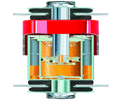 |
 | |||||||||||||
|
Conventional shock absorbers have one fixed characteristic. To achieve a high level of roadholding you need a very stiff damper with minimum movement - which also makes the ride less comfortable. The ideal for a standard car, bus or coach is to achieve the correct balance between these two. Whereas a Formula 1 car requires roadholding only with no comfort, a road vehicle needs to compromise between the two. Dutch anti-vibration specialist Koni has developed a shock absorber that addresses this tricky compromise and could lead to unprecedented levels of comfort and superior roadholding. The company said that its Frequency Selective Damping (FSD) technology will be particularly suited to coaches and buses. Here the balancing act is at its most delicate because safety standards are particularly rigorous on these vehicles but at the same time travellers also expect the ultimate in comfort. The technology works by allowing shock absorbers to be adjusted according to the ride requirements. Shock absorbers control three different actions: the rolling or pitching of the bus body, the roadholding ability of the wheels and the smoothness of the ride for passengers. Each of these actions occurs in a specific frequency and, as its name suggests, FSD is capable of increasing or decreasing the damping forces necessary in each area without affecting the other areas. 'A good highway gives low frequency but on the other hand sudden bumps and holes in the road give you high frequency on the axles/tyres/ shock absorbers,' said Koni's Jurgen Verlee. 'A conventional shock absorber doesn't react to these changing frequencies but only to the speed of the moving piston of the shock absorber. But with FSD the forces change according to the frequency,' he said. FSD has not yet been commercialised which prevents Koni from discussing the mechanics of the system in too much detail, but Verlee did reveal that it operates by using an extra compression chamber inside the piston. This chamber opens and closes extra orifices in the piston by a plunger which reacts to the occurring frequencies. This feature is not found on conventional shock absorbers, which is why they are unable to meet the joint requirements of safety and comfort in coaches and buses, said Verlee. He also claimed that alternative damper systems don't offer an adequate solution either. For example, load-dependent shock absorbers (typically used on trucks and trailers), which change characteristic automatically when the load of the vehicle changes, offer only minimal improvement on buses due to the relatively small difference between laden and unladen weight. 'This technology cannot solve this conflict of required lower and higher damping forces for different driving circumstances,' said Verlee. Position-dependent shock absorbers give extra comfort but inferior roadholding, he said. And while pneumatic and electronic adjustable shock absorbers may improve roadholding in the future, they are currently extremely expensive and hard to set up. Dampers equipped with Koni's FSD can be installed in exactly the same way as conventional dampers. Because the system is an integral part of the hydraulics of the damper, no additional cables, sensors or air hoses are required. This, said Verlee, will also make the system substantially cheaper than existing technologies. |
|||||||||||||
|
|
||||||||||||||
Home . About Thomas . ARTICLES . Zyber VistasA . Fiction . Non-fiction &technical . Pals . Contact
